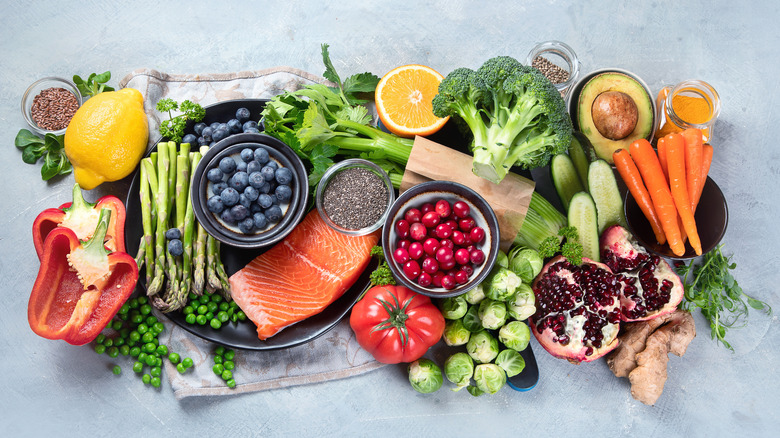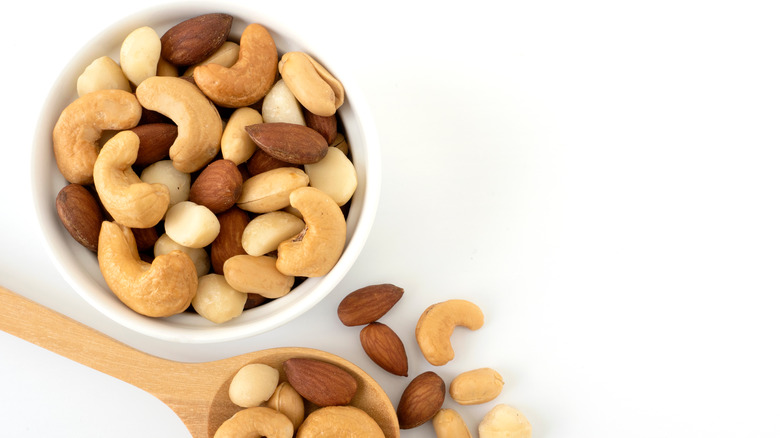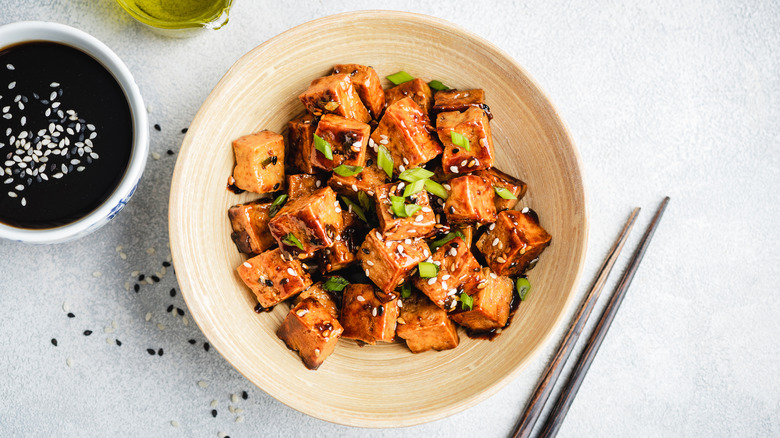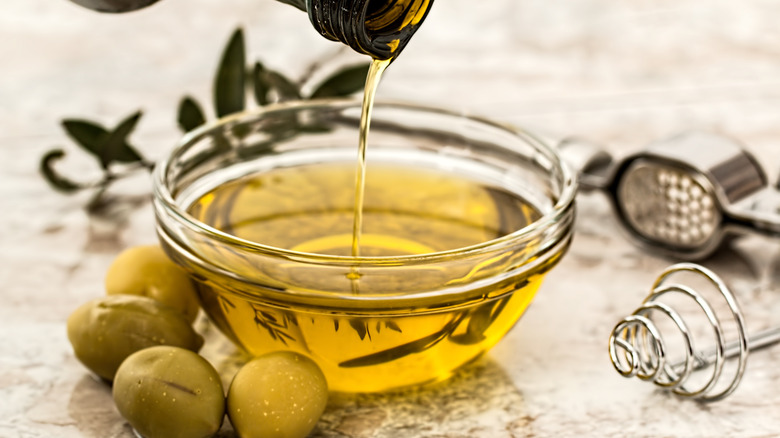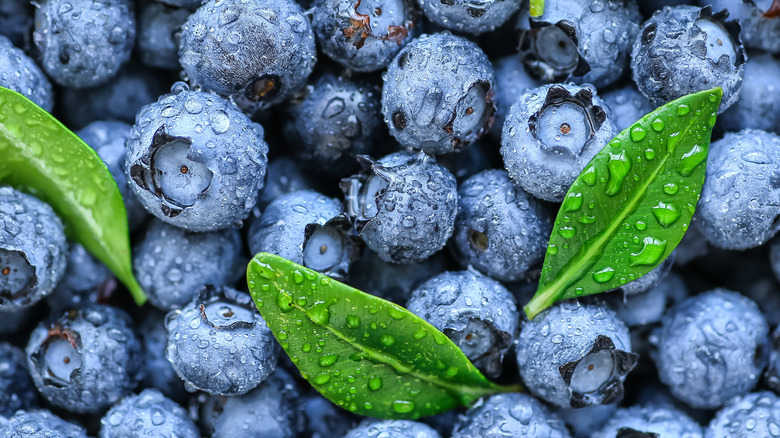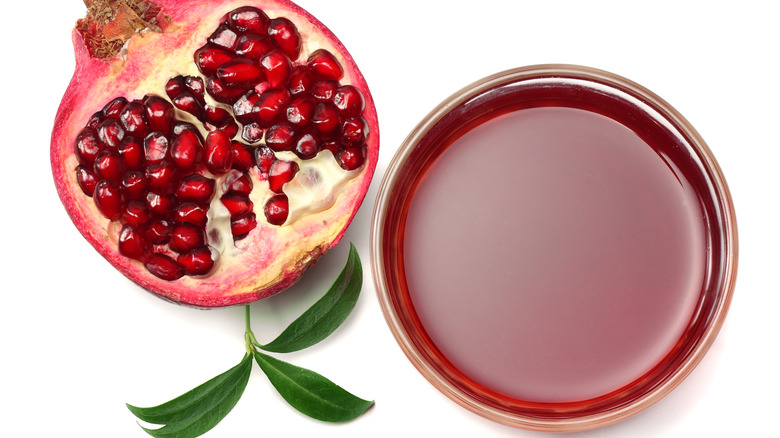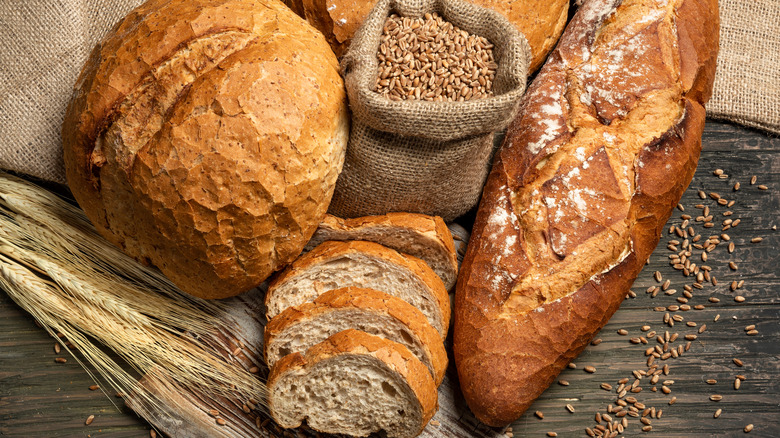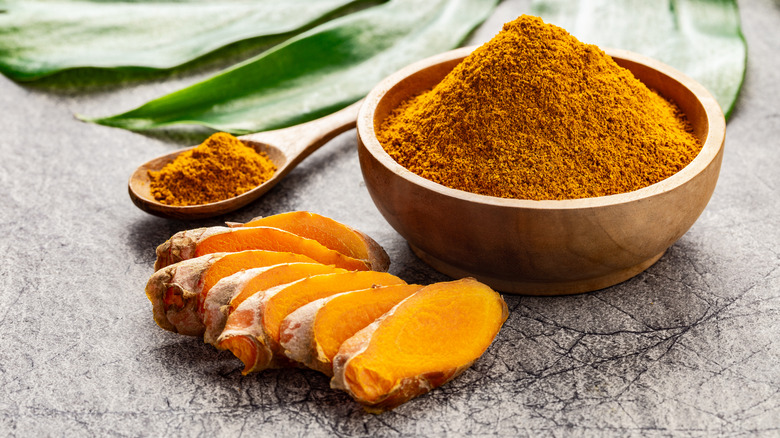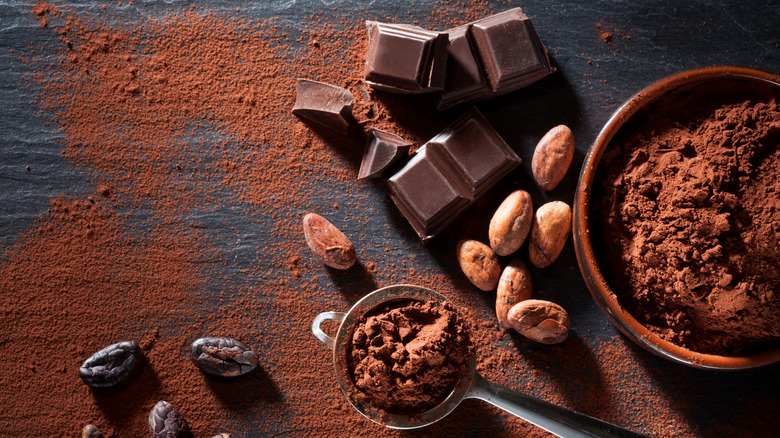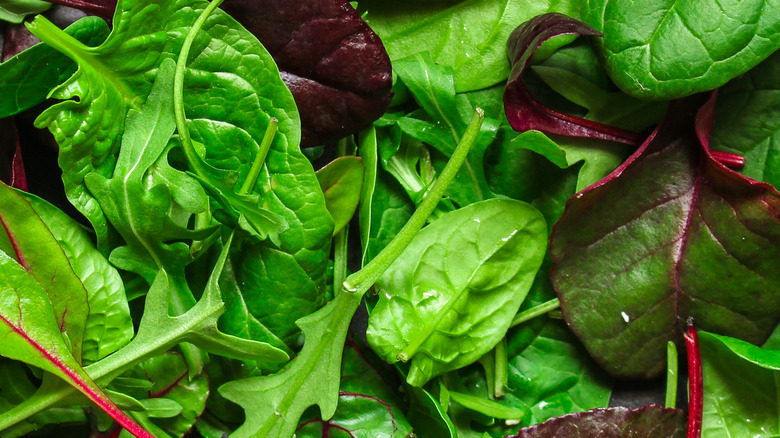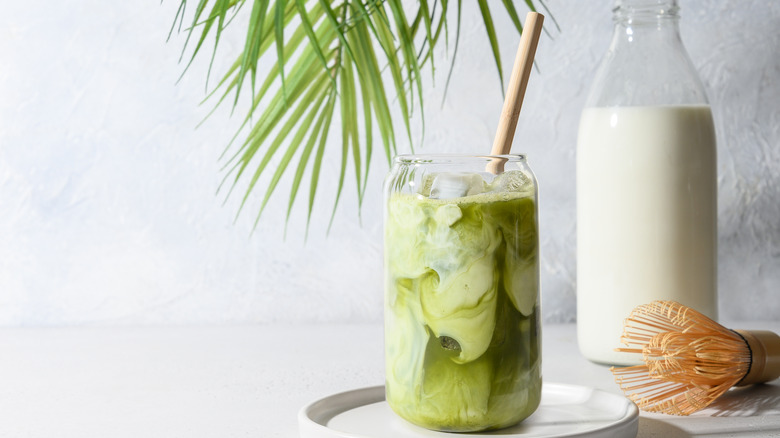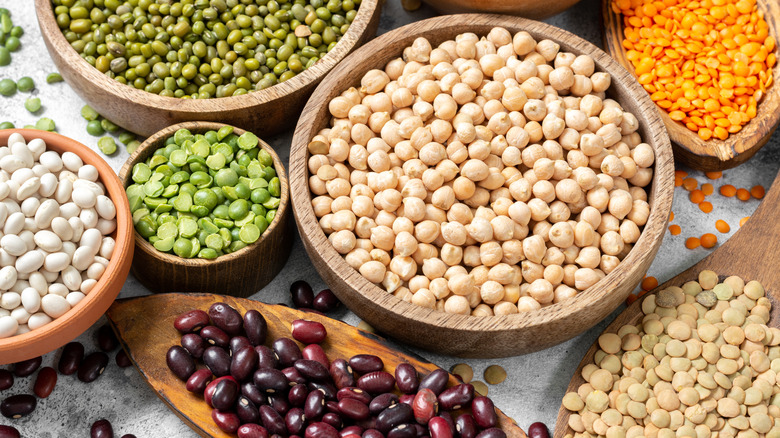Foods That Science Says Will Help You Live Longer
Longevity is a common goal for many health-conscious people these days. Not only do people want to live longer, but they want to thrive at every stage of life, including the later stages. And what we put into our bodies can have an impact on our overall health. Fortunately, there is evidence-based research that supports claims that certain foods may yield longer, healthier lives, and most can be found at any grocery store or farmer's market year-round.
Many of these items are also affordable, in addition to being highly accessible, and we've included a blend of fresh and pantry items. (Yes, pantry items can definitely boost your longevity goals!) Additionally, these are delicious and versatile staples, sure to please even the pickiest of eaters. In other words, don't think for a minute you'll be in taste deprivation. In fact, you may be surprised to find that a few of your favorite foods have made this list, including a common morning staple and a decadent dessert item.
Nuts
Nuts are a popular food item, given the low-carb and keto movement that blew up in recent years. In addition to fitting various dietary needs, nuts are easy to take on the go, perfect for tossing into a hiking bag or lunchbox, and make for a delicious, crunchy topping for ice cream or yogurt. With so many different kinds of nuts, it's hard to get bored. But what does the science say about this tiny superfood?
According to NPR, just a handful a day is all you need for a longer life. In fact, nuts are very popular in the diets of those living in Mediterranean countries where longevity is the rule rather than the exception. In fact, a 2018 study published in The New England Journal of Medicine found that participants at high cardiovascular-disease risk who supplemented nuts in their diet had a lower risk of major cardiovascular events.
And health experts at the prominent Dana Farber Cancer Institute agree, including Charles Fuchs, a researcher who tells NPR, "What we find is that regular nut consumers have about a 20 percent reduction in all-cause mortality." His team's findings support overall lower rates of heart disease and cancer, two of the leading causes of death in the United States.
Plant-based proteins
Plant-based proteins are definitely worth mentioning on a list of longevity foods and Harvard Health Publishing agrees. The outlet references promising data touting the ability of plant-based proteins to boost longevity. Tofu lovers rejoice! They cite studies that find that getting 3% more of one's total calorie intake from plant-based proteins (i.e. beans and tofu) lowered the risk of premature death by 5%.
Additionally, shifting 3% of calorie intake away from animal products (i.e. meat, dairy, poultry, and fish) and replacing them with plant-based proteins, corresponded with a 10% decrease in all-cause mortality for both men and women. Specifically, replacing red meat and eggs with plant protein reduced the death risk in men by 24% and women by 21%. These studies suggest that it's not just the act of eating plant-based proteins, per se, but the act of choosing plant-based instead of meat-based proteins, which can stifle our longevity.
Fish
For those who love seafood, you're going to be happy to hear the news: Eating fish regularly can reduce your chances of developing several health conditions over the course of your life, according to Everyday Health. In fact, studies have found that those who eat fish with a high omega-3 fatty acid content, twice a week, have extended their lives by 2.2 years longer. But that's not all. Omega-3 fatty acids found in fish won't just extend your life but will help you live a better life along the way. In fact, studies have shown your heart will benefit significantly from a twice-weekly serving of fish, including a reduction in coronary heart disease, according to the Journal of the American College of Cardiology.
And those aren't the only health benefits fish promises to provide. Eating fish regularly can also reduce prostate cancer risk for men, postpartum depression for women, reduce the risk of Alzheimer's disease, and treat autoimmune disease (via Everyday Health).
Olive oil
Oil is a common staple for just about any kind of food preparation. But it's oil that comes from olives that has some of the greatest benefits for our health. Olive oil began to gain a lot of traction in the scientific literature over the past couple of decades, with a confirmed protective effect against the development of several chronic diseases. One 2015 study published in the British Journal of Nutrition aimed to understand the relationship between olive oil consumption and mortality, cardiovascular disease, diabetes, obesity, cancer, and metabolic syndrome.
The results? Recent research has shown that regular consumption of olive oil is associated with increased longevity. Additionally, this golden elixir has been shown to prevent risk factors associated with cardiovascular disease, cancer, and even diabetes. When it comes to cancer, olive oil has been shown to help prevent breast and gastrointestinal cancers. Researchers suggest olive oil has a great deal more promise than what's already been discovered and will continue studying its potential for disease prevention and longevity.
Purple berries (blueberries)
Blueberries are vibrant and gorgeous, but there's far more to be said than just their good looks. In fact, they're known as being one of the longest-standing superfoods across cultures around the globe, per Blue Zones. That's because they contain powerful dietary compounds known as flavonoids, antioxidants, and anthocyanins. These anti-aging compounds have anti-aging benefits, as well as positive impacts on our brain health, including effects on learning and memory. Perhaps even more powerfully, blueberries have the ability to increase neurogenesis, or one's ability to produce more neurons.
And that's not all. Researchers have found that blueberries protect against oxidative damage and inflammation in the brain. Blueberries may also improve motor skills and improve problem-solving abilities, according to Blue Zones. While these are a few promising cognitive effects of eating blueberries, researchers feel they're just scratching the surface of all the potential they withhold. So the next time you're thinking of whipping up a batch of pancakes or muffins, be sure to toss a handful of blueberries into the mix.
Pomegranate juice
Scientists have become particularly keen on a gorgeous, ruby-red fruit called pomegranate, particularly when it comes to its juice. According to Science Daily, pomegranates and pomegranate juice have a powerful anti-aging secret, now finally revealed. Interestingly, a certain molecule found in this superfood is processed by our gut microbiome, and as a result, mitochondria take on a protective effect against aging. This protective effect has been found to reverse cell damage and aging in muscle tissues, as well as helping to repair dysfunctional cells that lead to Parkinson's disease.
While most studies have found positive effects of consuming pomegranates on animals such as rodents and worms, human studies are now underway. What scientists have found is that pomegranates in and of themselves don't produce a positive effect, but, rather, it's the way our body processes pomegranates (per Science Daily). Namely, it's our gut microbes within our intestines we have to thank. Thus, the effects of pomegranates can vary from person to person. But researchers are optimistic the benefits can vastly improve the effects of aging for a majority of people.
Whole grains
If you think whole grains is a term only used for cereal and bread, think again. Whole grains also include delicious foods such as popcorn, oats, and quinoa. And researchers are uncovering promising new evidence suggesting these foods can promote longevity by preventing cardiovascular disease, according to Live Science. In fact, a prominent study, known as The Nurse's Health Study, included data collected from roughly 74,000 participants over the course of decades.
The first significant finding was that a diet with 28 grams of whole grains per day corresponded with a 9% lower risk of cardiovascular-related death. Second, those who ate the bran component of whole grains had the greatest protective effects from dying of cardiovascular disease. Third, those who ate a serving of whole grains instead of a serving of red meat reduced mortality risk by 20%.
"If you are really looking into whole-grain consumption [in relation to] other diseases, stroke, heart disease, and colorectal cancer, whole grains are consistently associated with [a] lower risk of those diseases," Dr. Qi Sun, an assistant professor of nutrition at the Harvard School of Public Health, tells Live Science.
Turmeric
If you've heard of the popular health trend called golden milk and golden milk lattes, you probably already know that turmeric is considered a superfood. However, it's not just turmeric's complex flavor profile or gorgeous coloring that makes it all the rage but also its effects on how we age. By now it's been well documented that oxidative stress is a major factor in whether or not we develop certain diseases as we get older, according to a 2021 review published in Biomedicine & Pharmacotherapy.
Certain foods, like turmeric, can actually stall oxidative stress and thus increase longevity. The antioxidant potential of turmeric was found not only to be beneficial, but 10 times more powerful than vitamin E and greatly reduced age-related cell damage. Additionally, turmeric showed promising results when combatting cancer. Specifically, it has powerful anti-tumor effects and induces apoptosis (cancer cell death). These findings suggest eating an extra helping of yellow curry may be just the thing you need for anti-aging benefits and overall disease prevention.
Chocolate
Chocolate is perhaps the easiest food to incorporate into our diet, or rather, keep in our diet. It may be a surprising food to find on a longevity list, but hear us out. Dark chocolate contains powerful antioxidants that help eliminate free radicals within the body, help us process glucose more effectively (reduced insulin resistance), and reduce blood pressure, according to Verywell Health. For the most benefit, eat less processed chocolate and don't eat so much that you can't burn the calories.
While chocolate is a superfood, it's also calorie-dense and easy to overeat. In fact, even very small amounts of chocolate can have big benefits. One study found that participants who ate a mere 0.2 ounce serving of chocolate per day (roughly half a single square of a 100-gram dark chocolate bar), lowered their risk of heart attack and stroke by 39%. And if you're not keen on dark chocolate, you'll be happy to know that this study included both dark and milk chocolate varieties (via Verywell Health).
Another 2011 research review (via Verywell Health) found that consuming chocolate more than twice a week, regardless of whether the chocolate came from snack bars or beverages, resulted in 37% reduced risk of cardiovascular disease, 31% reduced risk of diabetes, and 29% risk reduction of stroke. This is perhaps the sweetest news of all for chocolate lovers.
Coffee
If hearing the good word about chocolate didn't make your day, maybe hearing about our next longevity superfood will do the trick. A recent article published by Harvard T.H. Chan School of Public Health states that coffee is linked to a longer life. Is your mind blown yet? If not, maybe this fun fact will: "People who drink up to eight cups of coffee per day may slightly lower their risk of early death compared with non-drinkers ... And it doesn't appear to matter if the coffee is caffeinated or decaf, brewed, or instant."
In fact, the study they reference found that the more coffee people drank, the lower their mortality risk for the duration of the study; and specifically, those who consumed more than 8 cups per day had a 14% lower mortality risk than those drinking no coffee at all. Sounds like good news for all the Starbucks lovers out there.
Dark leafy greens
If you're a salad fan, this one's for you. While it's likely not surprising that dark leafy greens are healthy, you may be surprised to know they may actually reverse aging by up to two years, according to the College of Medicine and Integrated Health. A recent study by these U.K. scientists found that changes to our DNA can be a beneficial effect of consuming kale, spinach, and swiss chard. Many of these benefits extend to chronic illness prevention, including a lowered risk of heart disease, diabetes, obesity, and dementia.
And scientists at the Institute for Functional Medicine may be leading the charge in this powerful research, suggesting our genetic clocks can be slowed by a diet rich in dark leafy greens. While it sounds like eating salads is a must to get the beneficial effects, scientists suggest these effects extend to a wide variety of colorful vegetables, including carrots and squash. For the most benefit, aim to include 9 ounces of leafy greens and 13.5 ounces of colorful veggies per week (via College of Medicine and Integrated Health).
Green tea
If golden milk lattes, hot chocolate, and coffee don't suit your fancy, fear not. We have one more longevity-promoting beverage to add to the list. WebMD suggests that drinking green tea may help you live longer. As reported by the outlet, a study that tracked 100,000 adults found that those who drank green tea three times per week had reduced instances of heart attack and stroke with protective effects lasting seven years. And that wasn't the only benefit. Green tea drinkers were living a little over a year longer than non-green tea drinkers.
Such longevity results may be due to the tea's ability to reduce cholesterol levels, promote healthier body weight, reduce the risk of heart disease, and lower the risk of some types of cancer. Another study showed that an 8-week trial that included Iranian women showed that three cups of green tea per day effectively improved weight, blood pressure, and cholesterol (via WebMD).
Legumes
Legumes are one of the best sources of protein in plant-based foods, and there are a ton of benefits to choosing this superfood. In fact, Blue Zones considers legumes to be "the world's No. 1 longevity food." Aside from the fact that they're widely available (on a global level), legumes are also affordable and pack a dietary fiber punch. Plus, they actually help promote survival in the elderly. A 2004 study published in the Asia Pacific Journal of Clinical Nutrition collected data across various cultures and found that legume consumption resulted in a 7–8% reduction in mortality. Interestingly, no other food group in this study showed the same potential in prediction survival.
Fortunately, legumes are one of the cheapest sources of protein, especially when compared to animal sources of protein. For instance, a pound of black beans averages $0.98, whereas a pound of beef averages about $4.60, and a pound of chicken costs about $3.50 (via Blue Zones). This makes this longevity food a true no-brainer when it comes to healthy eating.
